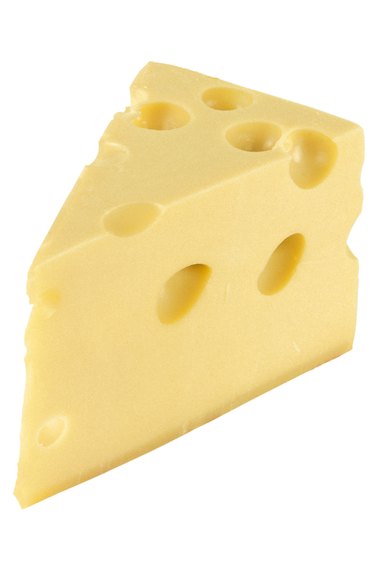 The holes in Swiss cheese are a byproduct of the microbes added to milk to make Swiss cheese. Image Credit: Comstock/Stockbyte/Getty Images
The holes in Swiss cheese are a byproduct of the microbes added to milk to make Swiss cheese. Image Credit: Comstock/Stockbyte/Getty Images
Havarti cheese originated in Denmark in the mid-1800s. It is less common than Swiss cheese, which is a term used to describe several related varieties of cheese known as Swiss Emmenthaler. Swiss cheese originated in the United States and, as such, is one of the most common cheeses found in American grocery stores. Both cheeses are classified as "buttery," although Swiss cheese is a harder cheese than Havarti.
Video of the Day
Texture
Havarti cheese is semi-soft in texture and pale yellow in color. Swiss cheese, on the other hand, is semi-hard. It is also pale yellow, and both cheeses come from cow's milk.
Taste
Havarti cheese smells buttery and can taste sweet or sharp, depending upon the amount of time it is aged. Typically, havarti cheese is aged for about three months; the cheese tastes stronger and more like hazelnut when it is aged for longer amounts of time. It is richer than Swiss cheese, which ages for three months as well.
Swiss and Havarti can be used interchangeably in many recipes. They have a similar taste profile, although they have moderately different textures, so the chef should be attentive to the changes that this might cause in a recipe.
Uses
Swiss cheese is commonly used in sandwiches, quiches, casseroles and fondues because it melts well. Havarti is slightly softer, but it also melts well and is a common sandwich cheese.
Pairings
Havarti cheese is typically paired with figs, raisins, walnuts, smoked turkey, pears and apples. Swiss cheeses have a bite to them, and so they are typically enjoyed with sweet fruits, such as pears, grapes and apples. Swiss cheese also tastes nice with spicy pestos or rich chocolate.
Havarti cheese pairs well with wines, including Cabernet Sauvignon, Pinot Noir, Merlot and Sauvignon Blanc. For beer drinkers, Havarti cheese pairs nicely with any Pilsner or Stout. Sparkling wines and ciders are recommended pairings for Swiss cheese, and stout beers blend well with the diverse flavors of Swiss cheeses.



























